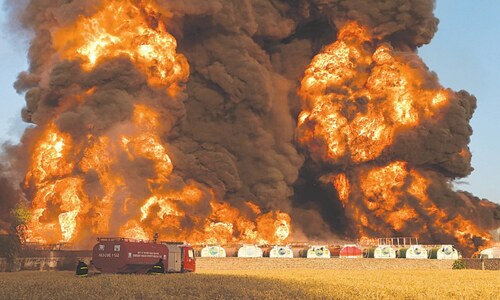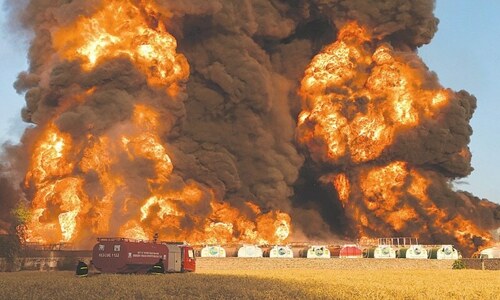IT was around 3:55pm last Saturday when Rescue 1122 Nowshera received a call alerting them to a fire at a private oil tanker stand in this locality, located on GT Road.
Firefighters who arrived at the scene, found a tanker ablaze right next to the only entrance to the premises, blocking their advance.
As they tried to douse the flames from a distance, the fire kept leaping from one tanker to another, with most of them packed with up to 50,000 litres of petrol each, turning the vehicles into balls of flame and smoke.
The blaze raged for more than eight hours, consuming at least 45 oil tankers, till it was extinguished in the early hours of Sunday. The inferno was so huge that plumes of smoke were visible from Peshawar, about 20 kilometres to the west.
The dust-swept town of Taru Jabba, famed for its delicious chapli kebab, is located on GT Road in Nowshera district, and borrows its name from Taru, meaning black partridge, and Jabba, a swampy area.
The town hosts the largest petroleum storage facility in the Khyber Pakhtunkhwa province, set up in 1986 with a capacity to store 80 million litres of fuel. It is a source for petroleum supply to all parts of the province, except Chitral, which has its own storage facility.
Around a week after the accident, the main gate of the tanker stand is still padlocked and one has to traverse an open field to enter from the side, through an opening the firefighters and locals created by pulling down a section of the wall to rescue some tankers during those frenzied hours.
Once inside, the yard still reeks of burnt petrol; the fire has stripped the once-mighty vehicles of their adornments and left bare skeletons hugging the ground.
The drivers have marked the vehicles, scrawling their registration numbers with chalk and white paint. Puddles of water, used to douse the flames, still dot the stand. Drivers, onlookers and insurance agents could be seen milling around the bare bones of burnt vehicles.
So what really happened?
Even more than eight days later, there is no clarity about how the fire started and gutted the tankers. Drivers, police and firefighters, everyone appears to be clueless.
A driver, Habib Khan (not his real name), told Dawn that he had left the stand a short while before the fire erupted, to pray and purchase food for Iftar.
“I rushed back to the site after hearing about the fire and could only rescue documents from my burning vehicle,” he recalled.
Khan is among many of those who have lost their vehicles to the blaze. He had left Karachi on April 24 and arrived in Taru Jabba on April 28. He parked his tanker at the terminal after getting the required documentation for the in-charge and was issued the queue number of 260.
A Rescue 1122 official also feigned ignorance about the cause of the fire. “When we rushed to the site, one of the trucks parked close to the entrance was on fire that soon engulfed other vehicles, as they were parked too close to each other,” the official said.
However, some locals and rescuers, with permission from the area police, smashed the windscreens of the tankers in the hope of finding their keys inside to drive them away from the fire, but to no avail.
The local police seem clueless about how the fire started. “Most of the people are away due to Eid holidays and the Pakistan State Oil (PSO) and the Oil and Gas Regulatory Authority (Ogra) will share a report with us by Monday,” an official said.
For its part, PSO blames the fire on “a fault in the tank lorry of another oil marketing company”.
But Habib Khan squarely blames the depot management for the losses he incurred. He claims the firm had made it binding upon drivers to park their vehicles within a three-kilo
metre radius of the depot, but did not provide them with parking spots. Besides, he said, vehicles had to wait for decantation for about 20 days, as only 15 to 20 vehicles can be unloaded at the depot daily.
However, PSO maintains that it follows “strict regulations and pre-defined protocols” to ensure petroleum products are transported safely across the country.
The PSO spokesperson told Dawn that majority of the tank lorries affected belonged to the company’s own contractors, adding that their vehicles were comprehen-sively insured and the expense of the product loss will be settled by the company.
Haji Muhammad Ayub, president of the Oil Tankers Owners Association, also blamed the PSO’s policy of keeping up to 350 vehicles waiting for weeks for decanting, saying they had taken up the issue with Ogra and PSO on many occasions.
“We have asked the authorities time and again to reduce the number of waiting vehicles — each loaded with inflammable material — to about 50 to avoid any untoward situation,” he stresses. However, PSO did not pay any heed to them over fears such a move would leave the province dry.
Ayub said the association was scheduled to meet the Ogra chairman next week to discuss the issue.
Several letters the association has written to Ogra, PSO and other relevant authorities, and seen by Dawn, show that the authorities were informed about the perils of keeping hundreds of tankers loaded with oil waiting for many days.
But whatever the reason behind the fire, owners of uninsured vehicles like Habib will have to pay the ultimate price. The vehicle he bought for about Rs15 million has gone up in flames, and right now his hopes to continue earning a living wage also look bleak.
Published in Dawn, May 9th, 2022













































